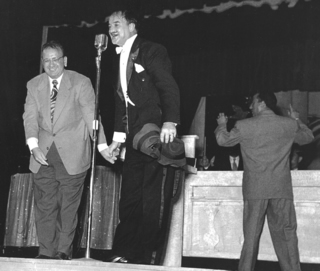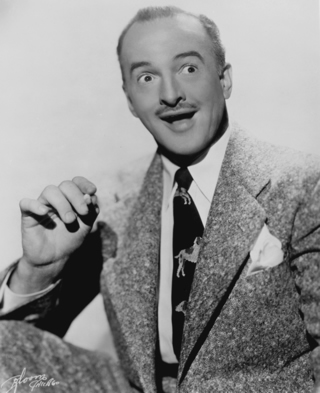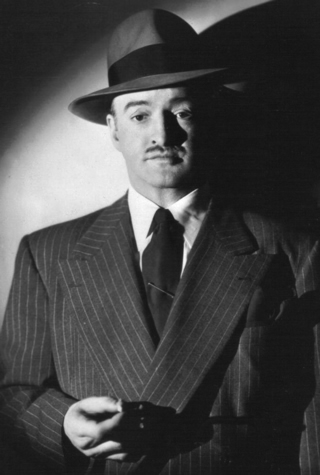His Royal Hipness - Page 3
 |
 |
 |
|
|
Lord Buckley's monologues drew from Louis Armstrong, Cab Calloway, and other black hep cats whose style crystallized in the 1930s. "Lord Buckley was not a beatnik," Prince Richard says. "He was a hipster."
Throughout his career, Prince Richard recalls, the monologues made up only part of Lord Buckley's shtick.
"He had two bits. He had the hip bit, and then he had the straight bit, the pantomime mimicry on current events."
In the "panto mimicry," as the Lord called it, folks from the audience would sit in chairs onstage. When touched by Buckley, each would silently waggle his or her lips while the Lord provided the improvised dialogue, often imitating Amos and Andy or Satchmo, often discussing politics and world events, and always ending with love.
"At the end of the routine, the guy sitting at the end would always kiss the girl next to him," Prince Richard says.
Trager's book, more an oral mythology than an oral history, is filled with raucous, often unbelievable tales told by friends and acquaintances, often second or third hand.
Whether you believe the stories or not, they make for lively copy. Did Al Capone really call the Lord "the only man who can make me laugh," and set him up in his own club, Chez Buckley? And did Buckley really repay the favor by setting fire to the mink coat belonging to the mobster's girlfriend?
One myth that most certainly is not true, Prince Richard says, involves the Mattress Farm. "We did not burn down our house in Las Vegas for the insurance money," he says.
Prince Richard also denies that jazz bassist and composer Charles Mingus ever "went after my father with a knife because of his [use of] black dialect."
"Those are lies told about him, that blacks were offended at his routines. Not one black person—entertainer, actor, fan, audience member—ever said one thing bad about Lord Buckley's dialect in his hip conversation. Never. Sammy Davis, Jimmy Witherspoon, Nat King Cole, Red Foxx—none of them."
In the early days, Lord Buckley had a bit of a mean streak onstage, insulting audiences that weren't sufficiently hip. But by his maturity in the early 1950s, coincidentally about the time he joined Alcoholics Anonymous, Buckley took on a more benign, even spiritual air, though one that could remain dark.
His rap on the Marquis de Sade, for example, sometimes scared audiences. One of his liveliest bits, 'The Train,' ended with screams and "forty-seven dead and eight injured, the worst accident in the state's history." And he did one monologue about a lynching.
"Here was a guy who was doing pro-civil rights pieces to not-necessarily-sympathetic audiences in the 1940s, if not earlier," Trager told writer Douglas Cruickshank. "I don't know if that's visionary, but it's certainly brave. He stuck his neck out for what he believed in—and contrary to what a lot of people might think, he was not using elements of African-American expression casually. His work addressed not only racial, but all kinds of social inequities head on."
'The Hip Messiah,' Buckley was called, and not just for his biblical monologues, or those dealing with quasi-religious figures like Abe Lincoln and James Dean.
"He called the cabarets in which he worked 'atomic age cathedrals,' and he meant it," Buckley's friend, novelist Harold 'Doc' Hume wrote in Swank magazine.
"Laughter is subconscious prayer," Lord Buckley told his friend Bob Ellison.
Buckley's habit of calling friends and acquaintances lords and ladies was more than an affectation, Hume said. "He believed that if everyone treated each other as sovereigns, as lords and ladies, the world could at least be made livable again."




